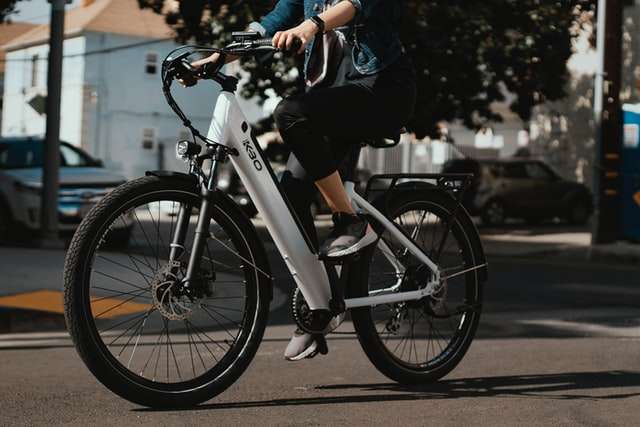With the speed of technological innovation, almost all new e-devices are lighter, smaller and more portable. As such, it often comes as a surprise to the first time electric bike buyer that electric bikes weigh more than their traditional counterparts.
However, upon a little digging, the extra heft of electric bicycles begins to make sense. So, what is an electric bike?
Basically, Electric Bike = Bike + Electric Motor + Battery.
By deduction, the weight of an electric bike is just the weight of a regular bike + electric motor weight + battery weight. That’s pretty much it.
Today, we’ll investigate electric bike weights, the factors affecting eBike weight, weight comparisons of popular electric bicycles and whether this added electric bike weight should matter to you.
- How much does an eBike weigh?
- Electric bicycles vs traditional bicycles weight
- Factors affecting electric bike weight
- Electric Bike Weight by Bicycle Type
- Electric Bike Weights Comparison Table
- Weights of popular Electric Bikes
- Does electric bike weight matter?
- How to reduce the electric bike weight?
- Final Take
How much does an eBike weigh?

Traditionally, the weight of a bicycle affects bike speed, maneuverability, and portability. In the world of eBikes, this isn’t the case. Almost all of the extra weight of an electric bike improves its convenience for the end user except maybe portability (eBikes are generally heavier to carry).
According to Bosch, pedelecs (pedal-assisted electric cycles) weigh around 6 – 8kg (13 – 17 lb) more than traditional bicycles. Some e-racing bikes can be as light as 10kg (22 lb), while cargo electric bicycles have been known to weigh as much as 40kg. However, a standard eBike weighs between 20 and 25 kilos. Here’s some common electric bike weights by bicycle type.
- Standard eBike: 20 – 25kg (44 – 55 lb)
- Electric mountain bike: 15 – 28kg (33 – 62 lb)
- Electric commuter folding bike: 20kg (44 lb)
- eCargo Bike: 40kg (88 lb)
- eRacing Bike: < 10kg (22 lb)
Even though electric bicycles are heavier than traditional bicycles, eBikes are easier to ride and require much less energy than regular bicycles. This is because all the electrical components on eBikes assist the rider. Some e-bikes provide assistance when pedaling only or when using the bike throttle or both. Either way, you’ll be able to ride easier and longer on an electric bike.
Electric bicycles vs traditional bicycles weight
In simple terms, the weight of an electric bike is just the weight of a conventional bicycle plus the weight of the electric motor, battery and any electrical accessories e.g LCD, switches, and wiring.
A comparable eBike is usually 8 – 15kg heavier than a comparable normal bicycle, for example, sixthreezero’s normal EVRYjourney bike weighs 32lb (14.5kg) while the EVRYjourney eBike weighs 70lb (31.8kg). This is a 28lb (12.7kg) difference.
Factors affecting electric bike weight

There are more than a few things that affect the weight of an electric bike. These include:
- E-bike type
- Frame Material
- Battery
- Electric Motor
- Tech: LCD, controller, wiring & other smart devices
- Tires
eBike type
A bicycle’s weight depends on the type of bike in question. This is true for traditional bicycles as well as electric bicycles. In general, electric cargo, mountain and fat tire bikes will weigh more than electric road, city, folding or racing bikes.
Frame Material
The materials used to make the bike frame have an effect on electric bike weights. The three most common materials used in eBike frames are steel, aluminum and carbon fiber.
- Steel is the heaviest
- Carbon is the lightest, most fragile and most expensive
- Aluminum sits in-between weight and price.
eBike Battery Weight
Normally, an average electric bike’s battery weighs 2 – 5kg. The weight of your eBike’s battery is a major contribution to its extra weight. A larger capacity battery carries more weight. For example, batteries from Bosch eBike systems weigh between 3 and 4 kg.
eBike Motor Weight
The average weight of an electric bicycle motor is between 3 – 5kg. Bafang’s 250W H700 rear electric motor weighs 3.2kg, for example. The electric motor is the engine of your electric bike. The most common electric motors are 250W. Street-legal eBikes are limited to 1kW (1000W) in most countries. Electric motors in eBikes tend to be either rear-wheel hub motors or mid-drive motors.
Brakes
The type of brake used in an electric bike also affects its weight. The use of disc brakes adds more weight in comparison to regular rim brakes. Some manufacturers also use ABS (anti-braking systems).
Even though these parts add some weight, they are worth their weight in gold because they provide significant safety benefits to the rider. For example, effective ABS in eBikes reduces your braking distance significantly. This feature is both critical and important especially when you need to brake suddenly on any slippery surface.
Tech
Other tech components affect an electric bike’s weight. These components include LCD screen, controller, buttons, switches and any other wiring on the electric bicycle.
Tires
Again, similar to regular bikes, bigger or fatter tires add more weight to your electric bicycle. The advantage of fatter, wider tires is that they provide additional grip and stability to the biker in exchange for a slower acceleration and speed. In general, eBikes tend to have wider tires.
Related post: How much do mountain bikes weigh?
Electric Bike Weight by Bicycle Type

I’ve compiled a list of electric bike weights by bicycle type to provide a range of bike weights you can expect when considering an eBike purchase.
- Electric Folding Bikes
- Brompton Electric weight: 17.4kg (38lb)
- Hummingbird Electric 2.0 weight: 10.3kg (22.7lb)
- RadPower Radmini 4 weight: 30.4kg (67lb)
- Gocycle G4 weight: 17.6kg (38.8lb)
- Tern Vektron Q9 weight: 21.9kg (48.3lb)
- Electric Road/Commuter/City Bikes
- Ribble Endurance SL e weight: 12kg (26.5lb)
- Bianchi Aria E-Road weight: 12kg (26.6lb)
- Trek Domane+ LT weight: 14.7kg (32.3lb)
- Specialized Turbo Creo SL weight: 12.1kg (26.8lb)
- Giant Road E+ 1 Pro weight: 18.2kg (40.1lb)
- Cannondale Synapse Neo 2 weight: 18kg (40lb)
- ElectricCruiser Bikes
- Schwinn EC1 weight: 21.5kg (47.5lb)
- Ancheer 26” commuting cruiser weight: 22.6kg (50lb)
- Sixthreezero EVRYjourney eBike weight: 31.8kg (71lb)
- Electra Townie Go 7d weight: 21.2kg (48lb)
- Electric Bike Co Model C weight: 25.8kg (57lb)
- Cargo Electric Bikes
- Urban Family Arrow weight: 50kg (110lb)
- RadPower RadWagon 4 weight: 34.8kg (76.7lb)
- Tern GSD S10 weight: 27kg (60lb)
- Yuba Boda Boda weight: 27kg (60lb)
- Raleigh Stride 2 weight: 60kg (132lb)
- Fat Tire Electric Bikes
- RadPower Radrover 5 weight: 31.5kg (69.6lb)
- QuietKat Ranger weight: 29.5kg (65lb)
- Ecotric Fat Tire weight: 27.2kg (60lb)
- Aventon Aventure weight: 33kg (73lb)
- Bakcou Storm weight: 32.6kg (72lb)
- Electric Mountain Bikes
- Specialized Turbo Levo Comp weight: 22.5kg (50lb)
- Merida eOne-Sixty 10K weight: 22.9kg (50.5lb)
- Santa Cruz Bullit Carbon CC weight: 22.6kg (50lb)
- Giant Trance E+1 Pro weight: 24.6kg (54.2lb)
- Marin Alpine E2 weight: 24.5kg (54lb)
Explore the benefits of mountain biking and why you should try it
Electric Bike Weights Comparison Table
| Electric Folding Bikes | kg | lb |
| Brompton Electric | 17.40 | 38.00 |
| Hummingbird Electric 2.0 | 10.30 | 22.70 |
| Radpower Radmini 4 | 30.40 | 67.00 |
| Gocycle G4 | 17.60 | 38.80 |
| Tern Vektron Q9 | 21.90 | 48.30 |
| Electric Road Bikes | kg | lb |
| Ribble Endurance SL e | 12.00 | 26.50 |
| Bianchi Aria E-Road | 12.00 | 26.50 |
| Trek Domane+ LT | 14.70 | 32.30 |
| Specialized Turbo Creo SL | 12.10 | 26.80 |
| Giant Road E+1 Pro | 18.20 | 40.10 |
| Cannondale Synapse Neo 2 | 18.00 | 40.00 |
| Electric Cruiser Bikes | kg | lb |
| Schwinn EC1 | 21.50 | 47.50 |
| Ancheer 26″ Commuter | 22.60 | 50.00 |
| Sixthreezero EVRYJourney | 31.80 | 71.00 |
| Electra Townie Go 7d | 21.20 | 48.00 |
| Electric Bike Co Model C | 25.80 | 57.00 |
| Electric Cargo Bikes | kg | lb |
| Urban Family Arrow | 50.00 | 110.00 |
| Radpower Radwagon 4 | 34.80 | 76.70 |
| Tern GSD S10 | 27.00 | 60.00 |
| Yuba Boda Boda | 27.00 | 60.00 |
| Raleigh Stride 2 | 60.00 | 132.00 |
| Fat Tire Electric Bikes | kg | lb |
| Radpower Radrover 5 | 31.50 | 69.60 |
| QuietKat Ranger | 29.50 | 65.00 |
| Ecotric Fat Tire Bike | 27.20 | 60.00 |
| Aventon Aventure | 33.00 | 73.00 |
| Bakcou Storm | 32.60 | 72.00 |
| Electric Mountain Bikes | kg | lb |
| Specialised Turbo Levo Comp | 22.50 | 50.00 |
| Merida eOne-Sixty 10K | 22.90 | 50.50 |
| Santa Cruz Bullit Carbon CC | 22.60 | 50.00 |
| Giant Trance E+1 Pro | 24.60 | 54.20 |
| Marin Alpine E2 | 24.50 | 54.00 |
Weights of popular Electric Bikes
Here’s a shortlist of the most sought after electric bikes by their net weights (with battery included).
- Orbea Rise M20 weight: 16 – 18.5kg (35.3 – 40.8lb)
- Sur Ron X weight: 50kg (110lb)
- Specialized Turbo Levo weight: 22.5kg (50lb)
- Vanmoof S3 weight: 21kg (46.3lb)
- Orbea Rise M10 weight: 16 – 18.5kg (35.3 – 40.8lb)
- Levo SL weight: 17.35kg (38lb)
- RadPower Radrover 5 weight: 31.5kg (69.6lb)
- Brompton Electric weight: 17.4kg (38lb)
- Aventon Pace 500 weight: 22.2 kg (49lb)
- RadPower Radmini 4 weight: 30.4kg (67lb)
Does electric bike weight matter?

For most people, the answer here is no. The most frequent users of eBikes today are between 40 – 70 years old and ebikes are mostly used for short errands, commuting or by people with physical limitations. The convenience of the electric motor assistance exceeds the added weight of an average eBike for most people..
When does electric bike weight matter?
The weight of an electric bike may matter to you if you use your eBike for high performance activities like racing or competitive sports.
In that case, you’d want to get more information from experts on the best eBike for you. Also, if you do a lot of bicycle touring, you might want a lighter, more portable electric bike.
Regardless, I still think you’d be more concerned with top speed, acceleration or even the range of the bike on a single charge more than the electric bike’s weight.
Related post: Can you ride an eBike without the battery?
Does a heavier eBike weight affect your ride?

Nope, a heavier eBike weight shouldn’t affect your ride. The worries about the heavier weight of eBike tend to revolve around speed and portability.
In the case of speed, you don’t have to worry. This eBike study shows electric bikes travel 2 – 3mph faster than regular bikes, on average. Electric bikes also go further. A typical eBike share ride is 3 miles, while a typical bike share ride is 1.9 miles.
As for portability, it is true an electric bike will be heavier than a regular one. However, if you park your bike downstairs, in a garage or a bike rack, you should be fine. You will only have an issue with your electric bike’s weight if you have to carry it off the ground or overhead for a long distance.
How to reduce the electric bike weight?
There are some easy ways to reduce your electric bike’s weight. Before you do this, please keep in mind that most of these will change the performance of your eBike.
Note: Check your bike manual to see if these changes affect the warranty on your bike before switching out parts.
1. Change tires
Replacing your current tires for thinner ones will reduce the overall weight of your eBike. Make sure you find out your tire size before purchasing a new one.
2. Reduce battery and motor capacity
Use a smaller capacity battery and electric motor pack for your eBike. This will reduce the weight of your eBike, but ask the manufacturer for the effect on your electric bicycle’s range.
3. Remove the drivepack entirely and just ride manually
Some eBike manufacturers allow you to remove the electric drivepack entirely and replace it with a storage cover, but you will have to ride without the electrical power.
Final Take
Even though eBikes are modern bicycles, they remain heavier than their traditional cousins. Over time, we can expect that electric bike weights will continue to decrease especially as most manufacturers move to aluminum and carbon frames. Also, battery & motor innovation will also decrease the weight of electric bike drivepacks which constitute the bulk of extra weight eBikes possess.
Sure, electric bikes are heavier. However, the research has shown that people use eBike share rides more than regular bike share rides, maintain higher speeds, drive farther on eBikes and use less physical energy too. All this shows that the extra weight of eBikes matters little in comparison to their usefulness.
However, performance riders should consider weight as well as overall performance of an electric bike more closely than the average rider.
Cheers! And thanks for reading. If you liked this, check out a related post on electric bike weight limits.


